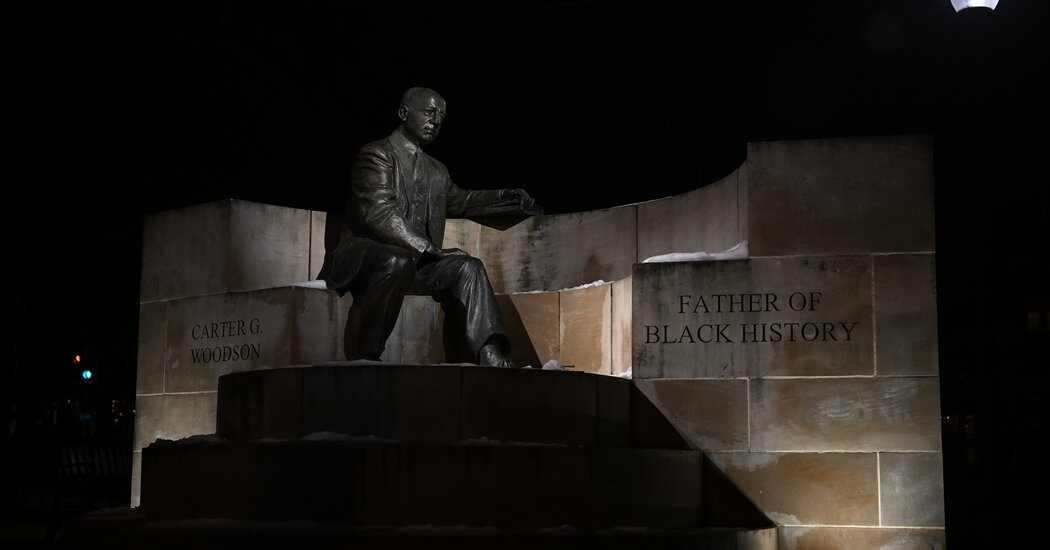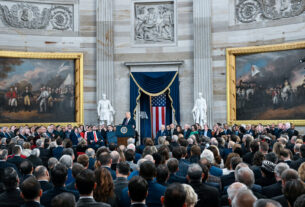Feb. 1 is the beginning of Black History Month, which for decades has recognized the contributions of Black people to American civic life and culture with festive luncheons, serious lectures, profitable merchandise lines and staid White House receptions.
But a month that was officially recognized nearly five decades ago by a Republican president, Gerald R. Ford, is dawning this year with new significance amid President Trump’s furious assault on diversity programs inside and outside the federal government.
Suddenly the study of Black history — or at least the dark corners of slavery, segregation and bigotry — appears to be an act of defiance.
“Black History Month existed long before presidents endorsed it, and it will continue, even if presidents do not,” said Martha Jones, a professor of history and a presidential scholar at Johns Hopkins University. Nonetheless, she added, “there’s a great deal to lament and even to decry” about the suppression of American history.
On Friday evening, Mr. Trump issued a proclamation that announced “February 2025 as National Black History Month,” “by virtue of the authority vested in me by the Constitution and the laws of the United States.”
Adding to mentions of celebrated Black historical figures such as Frederick Douglass and Harriet Tubman, he celebrated two contemporary Black conservatives, the scholar Thomas Sowell and Justice Clarence Thomas, as well as the golfer Tiger Woods.
Notably missing was a more somber mention of the “incredible prejudice and hardship” that African Americans have faced, like the one Mr. Trump included in his 2020 proclamation.
This time, he wrote, “As America prepares to enter a historic Golden Age, I want to extend my tremendous gratitude to black Americans for all they have done to bring us to this moment, and for the many future contributions they will make as we advance into a future of limitless possibility under my Administration.”
But as agencies and departments scramble to respond to Mr. Trump’s ban on “diversity, equity and inclusion,” those sentiments might be in doubt. Federal employees are scrubbing the pronouns out of their emails. Gender identity beyond male and female is disappearing from government websites.
At least one federal entity, the Defense Intelligence Agency, has “paused” recognition of Black History Month. The Air Force even removed a video celebrating the Tuskegee Airmen, a segregated unit of Black pilots who fought in World War II, before restoring it amid an uproar.
Asked how the White House would mark the coming month, Karoline Leavitt, the press secretary, said on Thursday, “We will continue to celebrate American history and the contributions that all Americans, regardless of race, religion or creed, have made to our great country.” On Friday, she appeared to catch herself when she said more specifically, “The president looks forward to signing a proclamation celebrating Black History Month.”
Every president since 1996 has issued an annual proclamation for National Black History Month, according to the Library of Congress.
But this year, as the federal government — the largest employer in the country — scrambles to comply with an executive order that terminates “all discriminatory programs” in the federal government, the month is beginning under a cloud of doubt.
For much of last year’s presidential campaign, Mr. Trump seemed to indicate that the study of the darkest corners of American history — slavery, the Confederacy and Jim Crow laws — should be frowned upon as an undermining of national pride. Now historians say those campaign talking points could become government policy.
“I find it cowardly, the idea that we would shrink from our past,” Ms. Jones said. “I believe we are strong enough as a nation to know that past, to make it part of our histories, to teach it, to read it, to learn it, and to still be a nation.”
There’s an oft-repeated joke among Black people that the celebration of their history was confined to the shortest month of the year, but there is a reason. The month grew from “Douglass Day,” which was observed in the 1890s on Feb. 14 — the day Frederick Douglass, an abolitionist and a former slave, celebrated his birthday — in “colored” schools in the Washington, D.C., area. In February 1926, the scholar Dr. Carter G. Woodson started Negro History Week, which built upon Douglass Day and the birthday of Abraham Lincoln, which falls two days before Douglass’s observance.
By 1970, it was Black History Month.
In 1976, Ford became the first president to officially recognize Black History Month, using the highest office in the land to “honor the too-often neglected accomplishment of Black Americans.” In the nation’s bicentennial year, Ford connected the Black struggle for equal rights with that of America’s founding.
“Freedom and the recognition of individual rights are what our Revolution was all about,” he wrote. “They were ideals that inspired our fight for Independence: ideals that we have been striving to live up to ever since.”
Before the efforts of scholars like Woodson to create a canon, American history was dominated by propaganda that was used to deny Black people full citizenship and political rights, said Dr. Kevin Gaines, the interim director of the Carter G. Woodson Institute at the University of Virginia.
History was littered with accounts that soft-pedaled the brutality of slavery, making it seem like a benevolent institution, while films such as “The Birth of Nation” helped fuel violence against African Americans, he said.
The scholarship of Mr. Woodson and others began to change that.
“It challenged those very biased anti-Black narratives that had been the norm in the American historical profession,” Mr. Gaines said. “African American history is at the center of modern American history,” he added. “That point, unfortunately, has to be emphasized in the current political and cultural climate that we’re in.”
Following the Black Lives Matter protests and the racial reckoning in 2020 that sprang from the murder of George Floyd, a backlash took shape. Some states began banning what they termed “divisive concepts,” for example — as detailed in legislation in Alabama — teaching that a person is “inherently responsible for actions committed in the past” or that a person should “accept, acknowledge, affirm or assent to a sense of guilt, complicity or a need to apologize” based on their race, religion, gender or background. The effort grew into a broader campaign by conservative activists and academics — one embraced by Mr. Trump — to dismantle diversity and inclusion programs.
But turning away from the thornier parts of American history misses an opportunity to explore the nuances of that history, Ms. Jones said. Even disturbing episodes such as the 1898 racist massacre in Wilmington, N.C., contains lessons about multiracial democracies being built during the rise of Jim Crow segregation.
“African American history has numerous examples of these kinds of multiracial alliances,” said Mr. Gaines, including the 1960s civil rights movements and the George Floyd protests. Implicit in the intelligence agency’s ban is the notion that highlighting diverse experiences within American history is inherently divisive, or that parts of American history are too uncomfortable for a workplace to confront.





